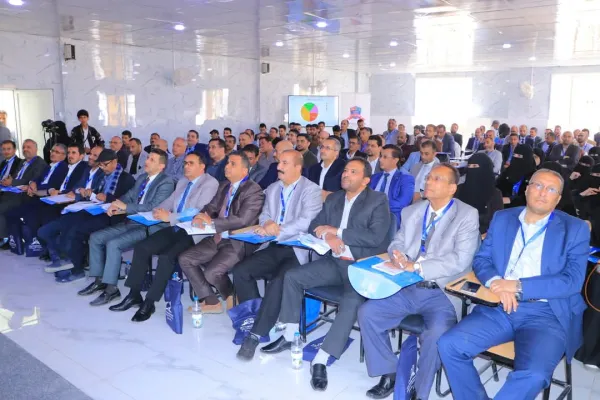الاخبار
The Emirates International University organizes a workshop on bridging the gap between computer education outcomes and labor market requirements.

Emirates International University Organizes a Workshop on Bridging the Gap between Computer Education Outcomes and Labor Market Requirements
University Media
On Thursday, May 15, 2025, the Emirates International University organized a workshop titled "Bridging Skills: Bridging the Gap between Computer Education Outcomes and Labor Market Requirements: Computing Graduates from University to the Labor Market: Vision and Application."
The workshop, attended by a select group of university presidents, academics, and deans of engineering and computer science colleges from various universities, representatives from the Ministries of Education and Communications, relevant authorities, employers, and graduates, aimed to diagnose the gaps between academic education outcomes in computer science disciplines and labor market requirements. It also aimed to assess the extent to which national academic standards, curricula, and teaching are aligned with current and future market needs. It also aimed to develop solutions and a practical roadmap to bridge the existing gap between outcomes and requirements.
At the workshop, Deputy Minister of Education and Scientific Research Dr. Hatem Al Duais commended the initiative of the UAEU to organize the workshop and engage relevant authorities and education and information technology experts at universities to discuss the causes and effects of the existing gap between computer education outcomes and labor market requirements. He also highlighted the importance of developing practical, measurable, and implementable visions and solutions to bridge this gap and create a comprehensive development renaissance.
He pointed out the UAEU's commitment to quality programs and its reliance on strategic planning in all its academic and educational activities and programs. He expressed the Ministry's readiness to work with universities to bridge the gap between education outcomes and the labor market in the fields of engineering, computer science, medical sciences, and technology.
The Deputy Minister called for cooperation in finding the necessary solutions to align education outcomes with labor market needs, emphasizing the need for concerted efforts to adopt the workshop's outcomes and recommendations and implement them on the ground to ensure improved quality.
For his part, Chairman of the Academic Accreditation and Quality Assurance Council for Higher Education, Dr. Ahmed Al-Haboub, highlighted the importance of the workshop in determining the extent to which higher education outcomes align with labor market requirements.
He noted that academic programs cannot be properly aligned without studying the labor market, emphasizing that universities' adherence to the NARS documents, their control, and their improvement represents one of the most prominent solutions for bridging the gap between educational outcomes and labor market requirements.
During the workshop, attended by Dr. Fouad Abdul Razzaq, Executive Director of the Information Technology Center, Dr. Nasser Hadi Al Muwafari, President of the Emirates International University, explained that the workshop is an interactive platform that seeks to shed light on the challenges facing graduates in their transition from the academic environment to practical life, with a focus on how to develop educational programs to keep pace with changes and serve the needs of society and the labor market.
He pointed out that the workshop seeks to identify and analyze the most prominent gaps between academic skills and required practical skills, monitor the opinions of graduates and employers on employment challenges, and develop practical solutions and proposals.
National expert Dr. Sharaf Al Hamdi reviewed the objectives of the workshop, the results of the beneficiary surveys, and the sustainable partnership between education and the labor market to bridge the existing gap between educational outcomes and labor market needs.
In turn, international quality expert Dr. Mohammed Al-Sharjabi reviewed the causes, context, and effects of the gap in knowledge, skills, and values missing among graduates, the demands of the labor market, and solutions to bridge the gap through the drivers of a knowledge-based economy based on institutional performance governance, information infrastructure, education, and innovation.
Engineer Mishaal Thabet, representing the private sector and employers, presented current and future trends in the labor market in computer science specialties and the skills required to develop graduates' capabilities.
Participants were divided into groups to review experiences from the graduates' perspective, analyze and evaluate the gap, the extent of the current and future availability of these knowledge, skills, and values, and the gap in the National Academic Reference Standards (NARS). They also discussed the sustainable partnership between education and the labor market to bridge the gap, and develop practical solutions and a roadmap for bridging it.
The workshop was attended by a number of university presidents, including Vice President of the Emirates International University, Dr. Ahmed Al-Badani; Secretary General, Dr. Fouad Hanash; Dean of the University's Center for Development and Quality Assurance, Dr. Sharaf Al-Hamdi; President of Tuntec International University, Dr. Wael Al-Aghbari; President of Al-Razi University, Dr. Khalil Al-Wajeeh; President of Azal University for Human Development, Dr. Mohammed Al-Aqili; President of the Yemeni University, Dr. Abdullah Yaya; Vice President of Azal University for Development, Dr. Masoud Raqi; and Vice President of Al-Nasser University, Dr. Nasser Al-Bahji. A number of deans of colleges and quality experts from Yemeni universities attended the workshop.
Website:
https://eiu.edu.ye
#Emirati_International_University
#Modernity_Excellence
#EIU
